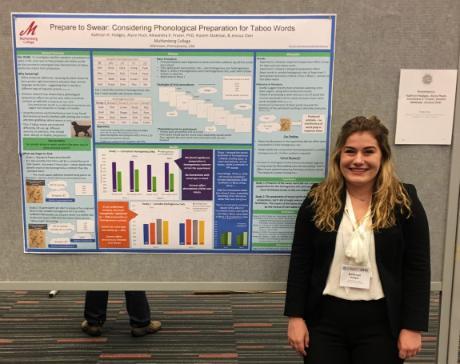Prepare to Swear
Have you ever wondered how your brain and mouth go from thinking about a word to articulating it?By: Laura Diorio '20 Friday, April 24, 2020 09:02 AM
 Illustration by littlepaw.
Illustration by littlepaw.Scientists who study the connection between psychology and linguistics are called psycholinguists, and Alexandra Frazer, assistant professor of psychology, is one of them.
Frazer researches the step-by-step process that occurs as we first decide to say a word, then mentally retrieve the word and finally produce the sound with our mouth and lungs.
And she is particularly fascinated with swear words. While some of us hardly use them—with the exception of a really awful day—others incorporate them into everyday language, often in extremely creative ways.
Her research asks, do we ‘produce’ swear words differently than other words? And do we prepare to say them differently depending on whether the situation is a painfully stubbed toe or a relaxed conversation with a friend?
 Frazer has been putting these questions to the test with the help of Muhlenberg student participants and student researchers, including Kat Hodges ‘20 (pictured), a biochemistry major, public health minor and member of the golf team. Students Alyce Huot '20, Hazem Abdelaal '20, Jessica Oxer '21 and Marwan Rajha '21 also assisted with the research.
Frazer has been putting these questions to the test with the help of Muhlenberg student participants and student researchers, including Kat Hodges ‘20 (pictured), a biochemistry major, public health minor and member of the golf team. Students Alyce Huot '20, Hazem Abdelaal '20, Jessica Oxer '21 and Marwan Rajha '21 also assisted with the research.
“When swearing is reflexive (like when you stub your toe), we know there is greater right hemisphere activation,” says Frazer. “Similarly, when people have brain injuries that result in speech disturbances, we often see that swearing is spared—but only the reflexive kind. So we first wanted to show that when swearing is planned, it isn't a categorically different process than other planned speech.”
Muhlenberg study participants were shown individual words that share an initial /f/ sound (e.g., feet, film, fork, f***) and asked to say them as quickly and accurately as possible. Frazer and Hodges found that in a set of words all starting with the same consonant, their test subjects showed no hesitation in saying swear words versus non-swear words, and that when planned, swear words are likely to be prepared and produced the same way non-profane words are.
In a second study, the sets of words were variable and the initial sound of the profanity didn't match the initial sound of the rest of the words (e.g., f***, paste, poll, pet.) In this case, over the course of the experiment, the swear words began to be produced more slowly.
“It appears that when the swear words ‘stick out’ from the other words, they became more disruptive,” notes Frazer.
While the research is ongoing, Frazer says she finds that even when they are used in casual conversation, taboo words are more arousing than other words, so speakers are more likely to focus on them. “People are more likely to pay attention to them as they are saying them, so there are times they will be produced in a different way.”
Hodges, who presented a poster about the research at the Annual Conference of the Cognitive Science Society in Montreal, Canada last summer, said, “This experience was eye-opening, because I got to practice presenting work that I love and on top of that got to network…I felt such a sense of community and was so thrilled that people were just as interested in my research as I was presenting it to them.”
Hodges adds that she's been very excited to be part of Frazer’s lab. “It really broadened my passions and interests in psychology and helped me figure out my passion in psychopharmacology, which combines my interest in biochemistry and psychology. Plus, I swear like a sailor, so I find this research really fascinating.”
